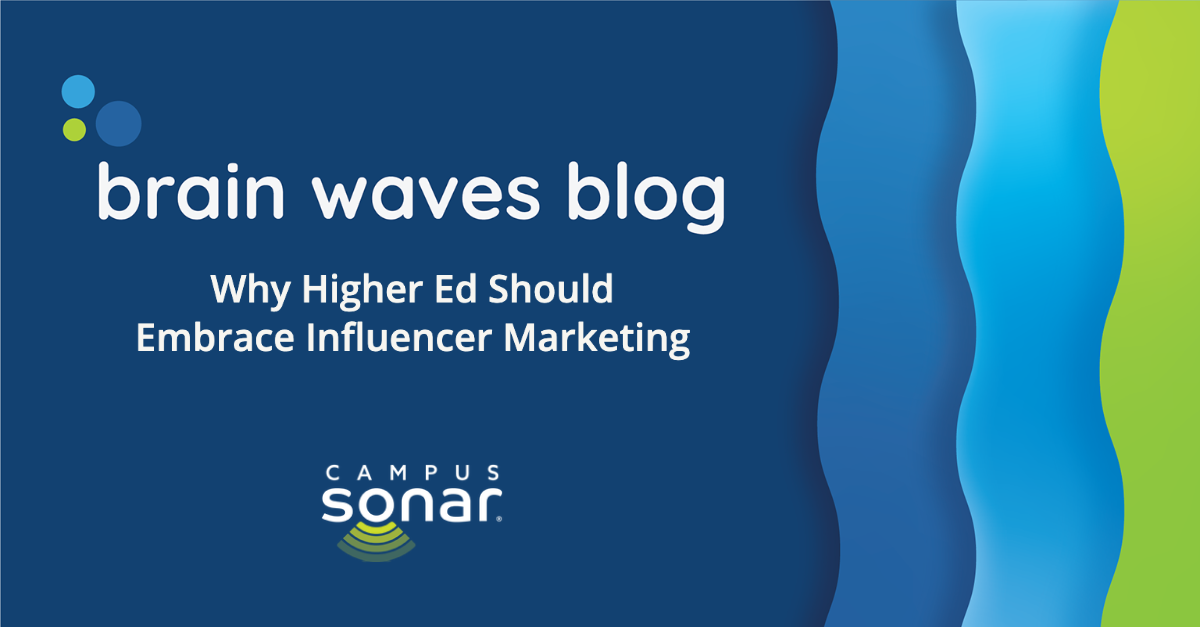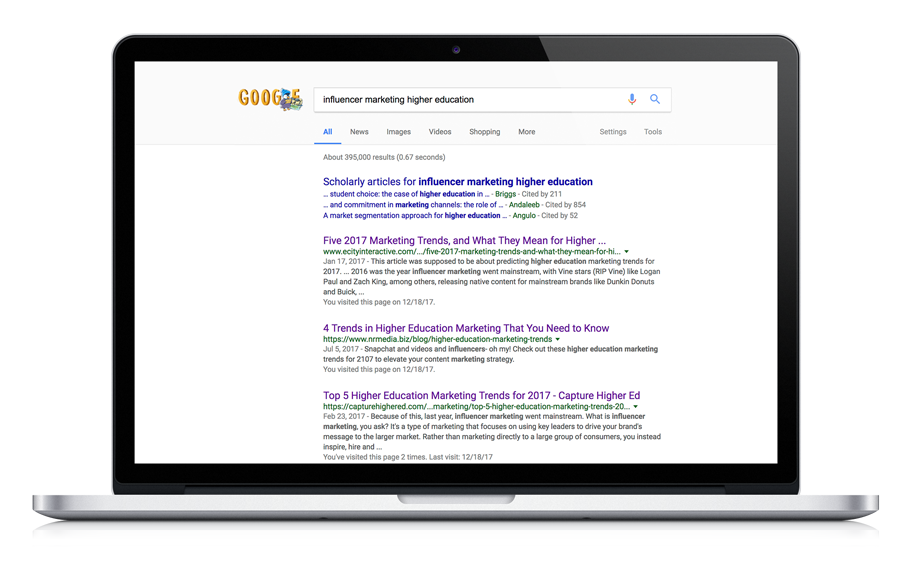Why higher education should embrace influencer marketing

2017 was the year for higher education to embrace influencer marketing. I know, because I googled "influencer marketing higher education" and the top three results for the year were about higher ed marketing trends. If you're feeling a little behind now that 2017 is on its way out, read Five 2017 Marketing Trends and What They Mean For Higher Education from Stephen App at eCity Interactive—he set the precedent for applying the mainstream influencer marketing trend to our industry.
But why should higher education embrace influencer marketing? It's not just trendy; influencer marketing supports strategic goals and provides benefits that are valuable to our industry. Let's look at some data and thought leadership from industries that were quicker to adopt influencer marketing.

How Influencer Marketing Contributes to Strategic Goals
About a year ago, Top Rank surveyed 102 brand strategists from multiple industries to determine the goals they used influencer marketing to achieve. More than 75 percent of the respondents reported their influencer marketing would:
- Improve brand advocacy
- Expand brand awareness
- Reach new target audiences
- Increase share of voice
Looking at these goals through my higher ed glasses, I think recruitment and fundraising are two strategic priorities that could benefit from well-executed influencer marketing. Here's how you might apply the influencer marketing goals to the functional areas of recruitment or fundraising.
Recruitment
- Amplify the voice of recently admitted or matriculated students within their high school, community, or workplace
- Tell a better story of the variety of experiences offered at your institution
- Partner with key local or industry influencers to reach a new geographic location or prospective students in a specific graduate program
- Increase mindshare through influencer affiliation in highly-competitive markets
Fundraising
- Highlight the results of alumni giving and encourage a sense of ownership from alumni donors
- Equip alumni with stories that resonate with their social networks
- Increase giving rate of young alumni
- Increase philanthropic mindshare of alumni during end-of-year giving appeals
There are likely also applications for this in retention, alumni engagement, and the marketing of specific campus programs or events.
Tangible Benefits of Influencer Marketing
Strategic goals are nice, but sometimes you want to know the tangible benefits your efforts will receive. Mark Schaefer covers the benefits of influencer marketing on his blog (he also literally wrote the book on influencer marketing). The benefits he identified have some applications to higher education.
Reach/Awareness: Whether online or off, influencers have already built an audience. If you're trying to reach a new target audience or build an audience from scratch, this can be very valuable. And you can be pretty sure that the audience is real, living, breathing, humans...not a network of Russian spam bots. If you're looking to reach prospective students who aren't responding to your other outreach communication, or alumni who haven't engaged with your foundation for years, tapping into the reach of an influencer can provide access that you didn't have before.
Research: If you build a community rather than conducting short-term campaigns, your influencers will act as a very engaged focus group. They'll tell you what's working and what's not. They're a fantastic feedback loop that can be counted on to provide quick responses to ideas for campaigns and messaging.
Content Ignition: I bet somewhere on your website, social accounts, or campus magazine you have a lot of really great content. But there's a lot of content out there, and it can take a connection with someone we trust to bring great content to our attention. Influencers serve as that connection between your content and their audience, and can secure more eyeballs on the content you've created for that specific audience—even evergreen content.
Site Authority and SEO: In higher ed, you're probably not overly concerned with your site authority—your .edu ranks pretty well in Google. But, if you're trying to rank for certain terms, influencers can help you create content that mentions your brand alongside those terms on their own websites and social media posts. If you're building any web properties from scratch, this can help you rank early, for the right things.
Strategic Leverage: If you're in a highly competitive field (say, business schools or niche academic programs) getting the right influencer on your team can be a strategic move. Particularly for highly specialized programs, there are only so many influencers to go around. If you have them, it's likely that your competitors don't. We're still early in the adoption curve of influencer marketing in higher education, so now might be the time to make your move and create strategic leverage.
Cost Savings: Influencers are individuals, not corporations. A couple hundred or thousand dollars means a lot more to them than it does for your media buyer. As you track your influencer marketing programs, you'll likely see that the ROI is much higher, and your cost per lead or impression is a lot lower. While you'll likely spend more of your staff time working with an influencer than you would buying media, if it results in conversions, it's worth it.
Authentic Advocacy: The best influencer marketing pairs a brand with an influencer that is legitimately happy to talk about the brand because they feel it provides value to their audience. You really can't put a price on this in a world where trust lies in the hands of "someone like me."
Campus Sonar and Influencer Marketing
Believe it or not, we're at the end of a Brain Waves blog post and I haven't even mentioned social listening yet! While we're not an influencer marketing business, social listening is one of the most effective ways to identify influencers. Once you've decided to work influencers into your marketing mix, you need to find them. Social listening is a great way to find influencers who participate in online conversation about specific topics, or find topics that are trending in online conversation among your target audience. A previous blog post explained what influencers are and how to use them, and we'll be producing more content—including campus case studies—about influencer marketing in higher education in the coming months.
In 2018, we plan to incorporate influencer marketing into the Campus Sonar marketing strategy. We'll share what we learn throughout the year, in keeping with our commitment to transparency.
Influencer Marketing and Higher Education
And I've got a secret for you—we're hard at work on a massive eBook (to be released in February) all about social listening and higher education. There's a chapter on identifying influencers through social listening, including how higher education can use influencers strategically. If you subscribe to our monthly email newsletter, you'll receive a free copy of the eBook before it's available to the public.

